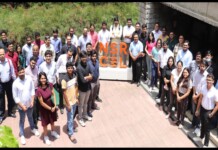Several companies are appointing Chief Sustainability Officers and expect them to contribute to the business outcome, not merely ensure compliance. With ESG (environment, social, governance) becoming stringent, the CSO’s role is becoming more strategic.
In a chat with J Shiruti of SustainabilityNext, Sumit Barat, CSO, BluPine Energy, shares insights from his two-decade journey.
Tell us a bit about BluPine Energy
BluPine Energy offers renewable energy services in solar, wind and storage in India. The firm of around 100 professionals, was formed only in 2022. It is backed by Actis, a global leader in funding sustainable ventures. It has a $800 million investment in India with an aim to develop a renewable energy portfolio exceeding 4 gigawatts.
What motivated you to become a Chief Sustainability Officer, especially in a relatively new field in India?
Before joining BluPine Energy, I served as the CSO of another renewable energy company. When I learned that Actis, a global leader in sustainable infrastructure investment, was launching BluPine Energy as a new platform, I was intrigued. Actis has a strong track record in sustainability, so I saw it as a golden opportunity to be part of something special.
As for my journey to becoming a CSO, I’ve always had a passion for the environmental and social aspects of business. Throughout my career, I’ve worked on helping companies meet and exceed their ESG (Environmental, Social, and Governance) targets. At that time, it was often about compliance and meeting various requirements, whether they were legislative or set by lenders.
However, my perspective began to shift when I pursued a course in Business Sustainability Management at the University of Cambridge. It was a turning point for me because it expanded my thinking beyond mere compliance. I started looking at the broader impact a company can have on the environment, not just in terms of mitigating negative effects but also creating positive ones. This led me to explore challenges like sustainable supply chain management, promoting local sourcing, and supporting local workers. My efforts in this direction were recognized by the board of my previous company, and I was promoted to the role of CSO. That’s how my journey in this field began.
India is experiencing rapid economic growth, but it comes with environmental consequences. How do you see the balance between economic growth and environmental sustainability in this context?
It’s important to note that economic growth doesn’t have to be at odds with environmental sustainability. Let me give you an example. Take the city of London, which about a century ago was one of the most polluted cities in the world. Londoners had to endure severe smog and environmental degradation. In fact, in the 1950s, the River Thames was declared biologically dead. It was a dire situation.
Fast forward to today, London is a completely different place. The air is clean, the water is drinkable, and the city has transformed. Despite its significant economic growth, London managed to develop in a sustainable manner.
Now, in India, we often witness issues like smog in cities like Delhi, and it’s a concern we need to address. Fortunately, companies like BluPine Energy, which operate in the renewable energy sector, have a minimal impact on the environment. The renewable energy industry in India is categorized as a “white category” by the Ministry of Environment and Forests, meaning we don’t require permits to start operations.
But that doesn’t make us complacent. We follow international regulations and undertake environmental and social due diligence even before acquiring land for a project. We make sure there are no unmitigable environmental or social costs associated with our projects. We hire renowned international consultants who adhere to standards such as the IFC Performance Standards to conduct environmental and social impact assessments. Our aim is not just to mitigate negative impacts but also to generate positive ones.
In essence, if a city like London can develop sustainably, there’s no reason why a company can’t. At BluPine Energy, we are committed to achieving economic growth and environmental sustainability hand in hand.
So, people say sustainability should be inculcated in our vision and mission statement as a core responsibility and not as a parallel or a segment in a company…
Yes, as I mentioned earlier when we talk about the environmental and social aspects, we often start with compliance. However, the real journey should move from compliance to efficiency and ultimately to innovation. Sustainability isn’t just about compliance; it’s a methodology that can make businesses better. Many company boards and management now recognize that sustainability is synonymous with better business. It has a positive impact not only on financial returns but also on stakeholder engagement, customer relations, and financial performance. We see more and more companies appointing sustainability roles within their management, including ours. It’s becoming an integral part of decision-making.
How do you envision the role of the CSO evolving in the next decade?
Fortunately, our vision at BluPine Energy is aligned, as we are a relatively new company. From day one, we set our sustainability vision. Looking ahead, the role of a CSO will shift from merely mitigating impacts to enhancing the company’s economic, environmental, and social performance. Similar to the CFO, who is responsible not only for raising funds but also for ensuring the company’s financial audits and numbers are robust and instilling confidence in stakeholders, the CSO’s role will become pivotal. They will be accountable for the company’s green claims. Nowadays, almost every company makes green claims, and the CSO’s role will be to not only prevent greenwashing but also defend the company’s reputation from greenwashing allegations.
As part of the management, CSOs ensure the company follows sustainable practices, responsibly sourced materials, and uses energy and water efficiently, but also, they will increasingly focus on data, statistics, and publishing sustainability reports. Sustainability reporting is becoming mandatory for many companies, even in India. Such activities will become more vital and profitable for CSOs in the future.
What is your advice to new CSOs?
There are two aspects to consider: capacity building and collaboration. Collaboration is of paramount importance, not only within your organization but also externally with peers and global counterparts. I’m pleased to share that Actis fosters a culture of collaboration by bringing CSOs from its group companies worldwide under one roof for discussions. This exchange helps us learn about the risks, challenges, opportunities, and initiatives our peers are undertaking, allowing us to bring back best practices. Sustainability professionals are not in competition with each other; it’s a relatively new profession, and we should reach out and help one another.
While BluPine Energy is a relatively new platform within Actis, I’d like to share an initiative by one of our group companies in South Africa, called Lekela. Lekela is an integrated energy company operating in South Africa. During my recent visit to London for the knowledge exchange program, I learned about their Inspire Network initiative. This initiative brings together multiple renewable energy companies in South Africa, including Lekela, BT Renewable Energy Global, the South African Wind Energy Association, and the Photovoltaic Industry Association. They collaborate to foster just transition skill development in the South African population for the renewable energy sector and enhance the sector’s social performance.
This initiative aims to address the rapid growth of the industry, the challenge of finding the right talent, and the aspirations within the community to be part of this sector. Collaborating with peers ensures that the talent pool remains sustainable and supports the industry’s growth without facing talent shortages.
The key difference between a CSO and an environmental department is the CSO’s broader impact on the entire business. Instead of focusing solely on your department’s environmental compliance and tasks, think about how you can positively impact the entire business. Plan projects that have a genuine revenue impact, not just cost savings. When approaching management, emphasize the business case rather than compliance requirements. Demonstrating the business sense of sustainability is crucial for gaining management’s support and becoming an integral part of the team.
We’ve discussed inter-organizational collaboration; let’s delve into building a sustainability-driven culture within an organization.
We are fortunate in this aspect, as a majority of our employees have joined us within the last year, and we have a strong sustainability pedigree from Actis. This culture and focus on sustainability are ingrained in everyone who joins from day one. Many employees choose to join us because of our robust sustainability practices. We have an ESG Committee that’s a part of our board, which meets as frequently as the board itself. This committee provides inputs to the board and ensures that sustainability initiatives are undertaken collectively. We believe that sustainability practices shouldn’t be limited to the sustainability department alone; they should involve all employees.
Sustainability cannot work in isolation. For example, if we’re aiming to become water-neutral, it requires collaboration from the design team, responsible for creating robotic dry-cleaning systems, the construction team that implements these systems, the operational team that operates them, and even the project finance team that funds these initiatives. Developing sustainable projects and involving all departments ensures alignment towards a common vision. Employees find it meaningful to contribute to environmental betterment through their roles, and this drives our sustainability-driven culture.
Sustainability is closely related to governmental policies, and these policies can change over time. How does this impact your long-term sustainability planning, especially since sustainability is supposed to be viewed with a long-term vision?
Staying updated on emerging regulations, both locally and internationally, is crucial for long-term sustainability planning. International regulations often influence local ones. This allows us time to prepare and adapt. For instance, the recent modification of the E-waste regulation this year included solar photovoltaic modules as E-waste, which was not regulated before. We were aware of the draft notification a year ago and had already prepared ourselves to responsibly recycle these modules. By the time the regulation came into effect, we had successfully implemented recycling practices. Being conscious of emerging local and global regulations or trends is essential because what’s global today can also become a local requirement tomorrow.











